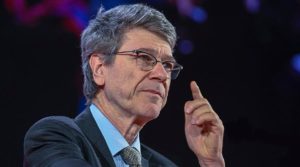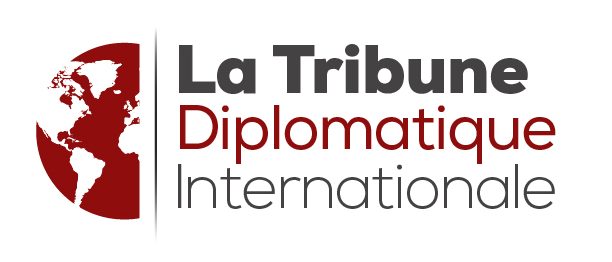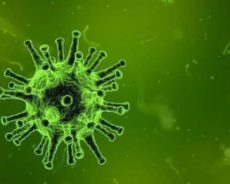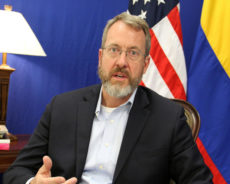
Mohsen Abdelmoumen: I saw your courageous intervention in the Bloomberg channel on October 4 and I think the world needs wise and just voices like yours. You have stated that the Americans would be responsible for the sabotage of Nord Stream 1 and 2. What can you tell us about this?
Prof. Jeffrey Sachs: The US role is not proven, but it stands to reason. The US alone had the motive, the means, and the opportunity to do this. Such industrial sabotage is part of the tradition of US covert operations. I think the Europeans will soon say, “We don’t know who did it.” The US, of course, will never investigate. It’s really notable that Biden warned in February 2022 that if Russia invaded Ukraine, the pipeline would be ended, and when queried, declared that the US had the means to do it.
Why does the mainstream media prevent opposing voices from being heard? Don’t you think that the great victims of the propaganda of these dominant media are democracy and freedom of expression, of which they claim to be the champions?
The mainstream media are largely mouthpieces for official policy. There is a deep intertwining of state power and major corporate power (which owns the mainstream media). The media do not like to present opposing views, and the government, of course, views the media as an opportunity for “selling” its message, also known state propaganda.
What do you think is the impact of Western economic sanctions against Russia on the world economy?
First and foremost, the sanctions have devastated Europe, which is now in a deep economic crisis. They have hurt the world economy more generally, with very harsh consequences for many developing countries. They are misguided in my view. I warned at the start that the sanctions would not succeed in their stated purposes.
Aren’t these economic sanctions against Russia counterproductive?
The entire war is disastrous, including the sanctions regime. The war could have been avoided if the US had agreed not to expand NATO, which is the core provocation to Russia. Of course, there are also internal issues in Ukraine, between Eastern and Western Ukraine, but these too could have been settled, for example along the lines of the Minsk II agreement.
How do you see the outcome of this war in Ukraine?
There is only one solution short of nuclear disaster, and that is a negotiated settlement in which Ukraine is neutral with security guarantees by the UN Security Council and other nations, and in which NATO does not expand to Ukraine and Georgia. Russia will escalate in order to stop NATO expansion.
In your opinion, are we safe from a nuclear war?
No, we are not safe. As Biden rightly said last week, we are closer to nuclear Armageddon than at any time since the Cuban Missile Crisis. The Cuban Missile Crisis was ended through diplomacy and compromise, not war. This crisis should also be ended through diplomacy and compromise.
In your opinion, wouldn’t a multipolar world free of US hegemony be beneficial for all countries?
We need a world that operates under the UN Charter and under the Universal Declaration of Human Rights, and in which the nuclear powers eliminate nuclear weapons as they are obliged to do under the Nuclear Non-Proliferation Treaty. There is no place or need for hegemony by any country.
You know the UN very well thanks to your position as consultant to several Secretaries General. In your opinion, shouldn’t the UN be reformed? Knowing that many resolutions are flouted and that some countries feel above the law, is the UN still useful today?
The UN is vital for our survival. Unfortunately, the US has treated the UN with contempt for decades, failing to ratify and honor UN treaties, and failing to respect the UN Security Council, as in the US-led wars in Iraq, Syria, and Libya. Of course, all the major powers should abide by the UN Security Council, and the UNSC should be a place of deliberation, not just name calling and posturing. As has been discussed for decades, the UNSC should also be reformed to represent a world that is very different from the world of 1945.
Recently, American senators and deputies asked Antony Blinken to take sanctions against Algeria because it buys Russian weapons: https://mcclain.house.gov/press-releases?ID=86A55993-9A60-4129-ACDC-5D34154A07EA. Do you think it is the role of a deputy or a senator, who are elected by the people, to interfere in the internal affairs of a third country? How do you explain the arrogance of these US senators and congressmen? I confess that as an Algerian, I am scandalized by this aggressive attitude.
The US Government is far too arrogant for its own good. It really believes its own press release, that the US runs the world. It does not, and should not.
You and your colleague Neil Harrison partnered on May 19 to issue a call in the journal Proceedings of the National Academy of Sciences, calling for an independent investigation into the origin of SARS-CoV-2. On the other hand, during a debate on June 14, at the Gate Center in Spain, you made a very important statement in which you said that you were convinced, knowing that you were chairman of the Lancet commission on covid for two years, that the virus was an error of biotechnology and not a natural accident, and that the laboratory in question was American. Has there been any follow-up to your request for an independent investigation into the origins of the virus? And who do you think has an interest in hiding the truth?
The US developed advanced biotechnology to manipulate SARS-like viruses, and funded US-China projects to take natural viruses and manipulate them with the possibility of making them far more dangerous. This was reckless work, promoted by the US National Institutes of Health. It may well be the source of the pandemic. We just don’t know yet. We do know, however, that the NIH has tried very hard to prevent an honest investigation as to whether US science contributed to the pandemic. This is a shame, and this kind of devious behavior should end. We urgently need transparency.
Interview realized by Mohsen Abdelmoumen
Who Is Professor Jeffrey Sachs?
Jeffrey D. Sachs is a world-renowned economist, bestselling author, innovative educator, and global leader in sustainable development. He is widely recognized for bold and effective strategies to address complex challenges including the escape from extreme poverty, the global battle against human-induced climate change, international debt and financial crises, national economic reforms, and the control of pandemic and epidemic diseases. Sachs serves as the Director of the Center for Sustainable Development at Columbia University, where he holds the rank of University Professor, the university’s highest academic rank. Sachs was Director of the Earth Institute at Columbia University from 2002 to 2016. He is President of the UN Sustainable Development Solutions Network, Chair of the Lancet COVID-19 Commission, Co-Chair of the Council of Engineers for the Energy Transition, academician of the Pontifical Academy of Social Sciences at the Vatican, Commissioner of the UN Broadband Commission for Development, Tan Sri Jeffrey Cheah Honorary Distinguished Professor at Sunway University, and SDG Advocate for UN Secretary General António Guterres. From 2001- 18, Sachs served as Special Advisor to UN Secretaries-General Kofi Annan (2001-7), Ban Kimoon (2008-16), and António Guterres (2017-18).
Professor Sachs has authored and edited numerous books, including three New York Times bestsellers: The End of Poverty (2005), Common Wealth: Economics for a Crowded Planet (2008), and The Price of Civilization (2011). Other books include To Move the World: JFK’s Quest for Peace (2013), The Age of Sustainable Development (2015), Building the New American Economy: Smart, Fair & Sustainable (2017), A New Foreign Policy: Beyond American Exceptionalism (2018), and most recently, The Ages of Globalization: Geography, Technology, and Institutions (2020).
Jeffrey Sachs is the 2022 recipient of the Tang Prize in Sustainable Development and was the corecipient of the 2015 Blue Planet Prize, the leading global prize for environmental leadership. He was twice named among Time magazine’s 100 most influential world leaders. Sachs has received 40 honorary doctorates, and his recent awards include the Legion of Honor by decree of the President of the Republic of France, and the Order of the Cross from Estonia.
Prior to joining Columbia, Sachs spent over twenty years as a professor at Harvard University, most recently as the Galen L. Stone Professor of International Trade. A native of Detroit, Michigan, Sachs received his B.A., M.A., and Ph.D. degrees at Harvard.
Professor Sachs website: https://www.jeffsachs.org/




